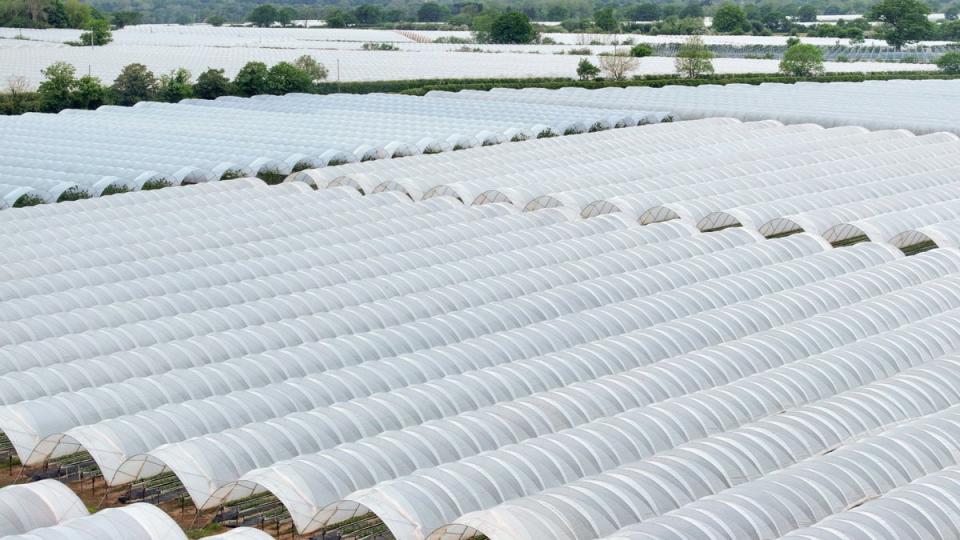Vulnerable workers coming to UK in post-Brexit deal at risk of bullying and sexual harassment, report finds
Migrant fruit and vegetable pickers coming to the UK to work on farms are being bullied and sexually harassed, a report on the seasonal worker visa scheme has found.
Testimonies from workers detail rape threats and harassment in a “pervasive” environment of bullying and humiliation on UK farms, with workers reporting passing out due to work conditions and having wages withheld.
Focus on Labour Exploitation (FLEX) says it raised concerns about the plight of tens of thousands of workers when a visa scheme was launched three years ago – and that the new research demonstrates the consequences of the government’s failure to act.
The workers, many of whom came from Kazakhstan, Uzbekistan or Kyrgyzstan, described “constant yelling” as a part of working life.
A small number of pickers said they were sexually harassed, with two telling researchers they were expected to provide regular sexual services to their employer.
Two workers said they had been sexually harassed by other pickers on the farm.
In one case a woman in her 40s from a central Asian country was threatened with rape by a group of men on the farm she was living and working on. She reported the threats to the farm management and was called to a meeting with her manager and the eight men who were making the threats in the same room, according to the report.
She told researchers: “Having experienced all this nightmare. Someone on the farm should be tasked to ensure the safety of lone female workers.”
She said she was hesitant to tell the authorities as she was worried if the farm management found out they “may decide to get rid of me”.

Stephen Kinnock, Labour’s shadow immigration minister, said that the evidence uncovered in the report was “deeply disturbing”.
He added: “Exploitation in the visa system must be tackled and it’s vital that for both UK and for migrant workers that the system is properly managed, controlled, and fair.”
In the new report, researchers at FLEX interviewed 83 migrant workers and received 399 survey responses from people on the seasonal worker visa route between June 2022 and October 2023.
Seven workers said that they were sometimes expected to provide sexual services for their employer or their associates, and eight people said they had received unwanted sexual attention or touching while doing their job.
Of the 83 workers interviewed, 13 people reported being shouted at, screamed at or humiliated. Researchers said this was to threaten workers into labouring faster. Interviewees said that “constant yelling” was par for the course when working on farms.
One 32-year-old man, Mansur, from Kazakhstan, said: “There are some supervisors who will pick on you and will give you a hard time. Sometimes it feels as if slavery is legal again.”
He described one incident where a female worker had fainted with stress after being berated by a supervisor.
The threat of deportation was used by employers, according to 12 workers.
Piece rates, or the rate at which fruit and vegetables are picked, were used as a way to dismiss people, the report found.
Two had experienced physical violence, with one 41-year-old woman from Romania saying she was kicked in the leg and told: “It’s okay, you can work.”

One 48-year-old man from Kazakhstan, Amir, said workers were called “f*****g idiots” and “b**ches” while picking strawberries and raspberries on a UK farm.
Another man from Kazakhstan, Rinat, 33, spoke about one particularly hot day, saying: “A very bad day was when we worked in the greenhouse with rotten strawberries. We had to wear overalls, masks and gloves. There were flies everywhere, dust and 44C weather.”
Researchers said they heard multiple accounts of people becoming exhausted or passing out because of the heat in plastic fruit tunnels.
One in 30 workers surveyed said they had had their wages withheld, and one in 50 reported not being paid at all. A third said they did not get any sick days, and one in six said they could not easily leave their site as access to transport was limited.
A previous report based on the research found that migrant fruit pickers were being saddled with debts of up to £5,500 before they arrived in the UK – with workers paying £1,231 on average to middlemen in their own countries.
The seasonal worker visa scheme was launched in 2019 to address labour shortages in the farming sector, and more than 30,000 people came to the UK on the visa last year. Earlier this month the government announced that the scheme would be extended until 2029 despite a warning from UN experts about risks of exploitation.
Lucila Granada, CEO of FLEX, said: “Three years ago we exposed key issues creating risk for workers in what was then a pilot scheme for UK horticulture. Three years on, this larger research shows the consequences of kicking these problems into the long grass. We need to ensure that workers are able to exercise their rights, and that protections and opportunities to seek redress are embedded into the seasonal workers visa route.”
Labour frontbencher Mr Kinnock added: “The Conservatives have failed to set up the single enforcement body they promised would crack down on exploitation.
“Labour would introduce a new single enforcement body for employment rights and protections, which would work tirelessly to prevent these examples of exploitation. We will also look at how we can restrict the use of repayment clauses for relocation and visa costs.”
A Home Office spokesperson said: “The welfare of all visa holders is of paramount importance. We continue to clamp down on poor working conditions and exploitation.
“Any criminal behaviour should be reported to the police as soon as possible.”


